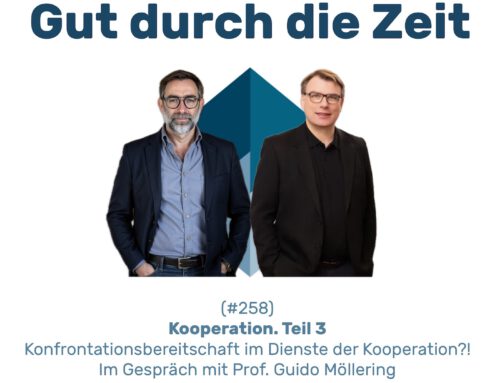INKOVEMA Podcast „Well through time“
#55 – Individual discussions in mediation
Why it sometimes takes two rooms when conflicting parties want to come together at one table. In conversation with Dr Isabell Lütkehaus
Well through time. The podcast about mediation, conflict coaching and organisational consulting.
Dr Isabell Lütkehaus, lawyermediator and author of the standard work "Basiswissen Mediation", lives and works in Berlin.
Contents:
- Individual discussions in mediation, ...i.e. when mediators speak with only one party during mediation. This procedure is initially legally permitted, as is expressly stated in Section 2 (3) sentence 3 Mediation Act, which refers to "separate discussions". However, it is important to note when it makes sense to hold individual discussions and when they are better avoided.
- When are one-to-one meetings useful?
-
- Gathering information, building trust in the order clarification/preliminary phase
- Clarification of needs and emotions in the problem presentation phase
- Conflict resolution phase in a deadlocked situation or in endless loops of recriminations
- With hidden agendas (mediation is only a strategic move, a stage for others or not a suitable stage, keyword: highly personalised information)
-
- OBSERVANCE OF THE PRINCIPLES OF MEDIATION IN INDIVIDUAL DIALOGUE
- Impartiality, as there is a risk of misinterpretation (individual interview appears to be a punitive measure or favouritism)
- Personal responsibility: voluntariness and information
- Confidentiality (disclosure, transfer of information to the round)
- Advantages:
- Individual discussions promote the self-assertion of the conflict parties,
- Sometimes they encourage a change of perspective, as there is no risk of losing face (rarely in my opinion),
- Recognising one's own conflict components and promoting accommodation, opportunity for solution-oriented negotiation,
- more comprehensive information for the mediator, deeper insights into conflict and psychodynamics,
- Escalation-preventing or calming effect, especially in cases of emotional overload,
- Strengthening the basis of trust between mediants and mediator,
- Possible acceleration of the process
- Disadvantages:
- Loss of strength of the mediation triangle/table
- Specific conflict dynamics are lost
- Pressure to reach an agreement is eased
- Isolation can have a hardening and escalating effect, which only becomes visible when people are brought together
- Build-up of inappropriate expectations towards the mediator
- Lack of focussing on conflict issues (fragmentation)
- Danger of (perceived, imagined) shifting of responsibility to the mediator
- Danger of psychologising the problems,
- Risk of loss of the mediator's professional distance due to intensive contact with the mediator,
- Increased procedural costs
Links
-
- Website of Isabell Lütkehaus
- Specialist article: I. Lütkehaus: I can't smell you, in: ZKM, 3/2020, 103 ff. (https://doi.org/10.9785/zkm-2020-230309)
- Specialist article: Fritz, R. / Klenk, Michael: Individual interviews - Part 1, ZKM 2016, 164 -169.
- Website Claus Roxin





Leave A Comment